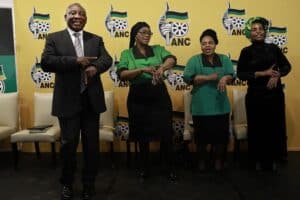As SA marked Women’s Month, which celebrates the milestones and achievements of its women, a politically charged event involving gender-based violence made the headlines.

The country’s deputy minister of basic education, Mduduzi Manana was forced to resign after he allegedly assaulted two women at a club in Johannesburg. Images of the incident went viral, sparking a massive social media outcry.
The incident should give South Africans pause for thought. It highlights deep issues about violence against women in a country where most women still suffer deep deprivation, exclusion and some of the worst gender-based violence in the world.
But not all women leaders in South Africa seem to appreciate what needs to be done. Take the response of Bathabile Dlamini, president of the governing African National Congress’s (ANC’s) Women’s League. She leapt to the deputy minister’s defence, arguing that the “attack” on him was “a political tool”. She went on to say that other political leaders had done worse. The league is the most powerful women’s lobby in the country.

GCIS
This isn’t the first time that leaders of the ANC Womens’ League have been on the wrong side of history on a range of critical gender issues, including sexual violence.
The ANC women leaders aren’t alone. Research has found that, disturbingly, women are often complicit in the violence perpetrated by their men.
Research also points to women elites striking “patriarchal bargains”. Deniz Kandiyoti, a leading academic on gender relations and developmental politics, argues that this strategy affords them positional power and status in exchange for their compliance and complicity in male-dominated political spaces.
This acceptance of patriarchal norms and rules to wrest what power they can, despite the fact that it disadvantages them, perpetuates the patriarchal status quo.
Women elites like this must be challenged and held accountable for their role in maintaining and supporting women’s oppression.
South Africa’s particular history
Patriarchal forces are tenacious. In South Africa’s case they have persisted, partly because of an unintended consequence of the struggle against apartheid when women made sacrifices for the “greater good”. This meant that women remained silent even when men leading the ANC abused their power.
Despite women’s commitment and contribution to the apartheid struggle they were never regarded as truly equal to men in the patriarchal and hierarchical structures of the ANC and its armed wing uMkhonto we Siswe. The irony was that the fight for equality didn’t extend to gender equality despite the rhetoric of a “non-racist and non-sexist and democratic South Africa”.
The result was that in the transition to democracy the promise of a more gender equal society struggled to gain traction.
South Africa’s circumstances are further compounded by the fact that it’s been severely handicapped by its history of colonialism and apartheid, which institutionalised racial and gender inequality. Research shows that this history is likely to have long lasting effects on sexist attitudes.

GCIS
In addition, pervasive structural violence – much of it invisible – means that the cards remain heavily stacked against South African women. This violence is also entrenched in societal structures – political and economic – and sustained by deep rooted inequalities of power and privilege.
Force for change
There is a vehicle for disruption, but it lies with civil society rather than government. South Africans have had some telling successes in standoffs with political elites and are increasingly calling them out on a range of issues.
Civil organisations have, for example, successfully challenged the use of public money to bolster mismanaged parastatals such as the power utility Eskom, South African Airways and the South African Broadcasting Corporation. And civil society action has led to senior figures losing their jobs and to the investigation of dubious contracts.
In this context the public pressure that led to Manana’s resignation and his public apology is a watershed moment in the politics of sexual violence in the country. It’s significant because the entrenched culture in the country is that neither corrupt or rogue politicians ever resign.
As another Women’s month draws to a close, it’s abundantly clear that ordinary South African women can’t pin their hopes on female politicians. Given the complicity of women elites in advancing male dominance and control, citizens must channel their energies into civil society and social media campaigns to mobilise against their oppression and the scourge of sexual violence.
Lyn Snodgrass, Associate Professor and Head of Department of Political and Conflict Studies, Nelson Mandela University
This article was originally published on The Conversation. Read the original article.






